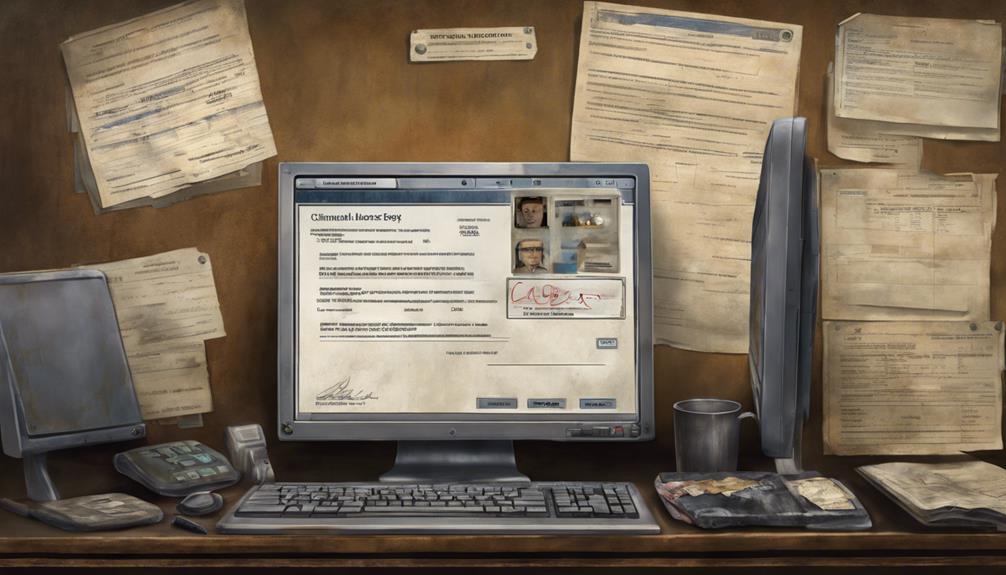Restraining orders, whether civil or criminal, can appear on background checks. They hold significance for roles where safety is paramount. Employers weigh the risks tied to such orders when evaluating candidates. Violating a restraining order can lead to severe legal repercussions, impacting job opportunities and personal relationships. Misdemeanor charges, fines, and potential imprisonment await violators. It's essential to comprehend the lasting effects on a criminal record for up to seven years. Transparency with employers is advised to prevent unwelcome surprises during checks. Further insight into legal ramifications and seeking counsel are pivotal.
Key Takeaways
- Restraining orders can show up in background checks for safety-sensitive roles.
- Thorough background checks increase the likelihood of revealing restraining orders.
- Employers assess risks associated with candidates based on restraining orders.
- Violating a restraining order can impact job prospects and personal relationships.
- Transparency is crucial to prevent surprises during background checks.
Understanding Restraining Orders
Understanding restraining orders is essential for individuals seeking protection from violence or harassment. These legal orders are put in place to prevent further harm to a victim and can encompass various types, including Emergency Protective Orders, Temporary Restraining Orders, Permanent Restraining Orders, and Criminal Protective Orders.
It's important to note that violating a restraining order can lead to contempt of court or criminal charges. When it comes to criminal background checks, restraining orders can indeed appear on a background check. This information is critical for employers, landlords, or anyone else conducting such checks, as it provides insight into a person's history concerning violence or harassment.
Individuals with restraining orders should be aware that this information may be accessible to others through a criminal background check, underscoring the importance of adhering to the terms of the order to avoid legal repercussions.
Types of Restraining Orders

Types of restraining orders can vary based on their duration and legal nature. Temporary orders provide immediate protection, while permanent orders offer long-term security.
Additionally, civil orders focus on preventing harm in non-criminal situations, whereas criminal orders involve legal consequences for violating the terms.
Temporary Vs. Permanent Orders
Temporary restraining orders (TROs) provide immediate protection for a limited period, typically lasting for 14 days in emergency situations. They are requested to address urgent safety concerns before a formal hearing for a permanent restraining order. In contrast, permanent restraining orders offer longer-term protection, lasting from three to five years. These court orders require a formal hearing where both parties can present their case before a decision is reached. Understanding the differences between temporary and permanent orders is crucial for navigating the legal process effectively.
| Temporary Restraining Orders | Permanent Restraining Orders |
|---|---|
| Lasts for 14 days | Lasts for 3-5 years |
| Provides immediate protection | Offers longer-term safety |
| Typically requested in emergencies | Requires a formal hearing |
| Addresses urgent safety concerns | Both parties present their case |
| Precedes permanent orders | Results from a formal hearing |
Civil Vs. Criminal Orders
Civil and criminal orders serve distinct purposes in the domain of restraining orders, delineating between protections in cases of harassment and criminal activities. Understanding the differences between these types of orders is essential when considering their implications on background checks and legal consequences.
Here are three key points to differentiate civil and criminal restraining orders:
- Purpose: Civil restraining orders are typically issued to protect individuals from harassment, domestic violence, or stalking, while criminal restraining orders are linked to specific criminal cases and may include directives like no-contact or stay-away orders.
- Enforcement: Violating either type of restraining order can lead to severe legal consequences, such as fines, imprisonment, or being charged with contempt of court.
- Visibility: Both civil and criminal restraining orders can appear in public records and impact background checks, potentially influencing various aspects of an individual's life, including employment opportunities and personal relationships.
Inclusion in Background Checks
Restraining orders, depending on the nature of the background check, can be included in the report.
Employers, particularly those in roles with safety or security considerations, may take into account any restraining orders revealed in a background check.
A violation of a restraining order that results in a conviction could heighten the chances of it showing up on a thorough background check.
Background Check Impact
Background checks for employment purposes may include the presence of restraining orders in a person's public record. Here are three key impacts of restraining orders on background checks:
- Employment Decisions: Employers may take into account the existence of restraining orders when evaluating candidates, especially for roles that involve security clearance. This information helps them assess potential risks associated with the applicant's behavior.
- Depth of Background Checks: The thoroughness and extent of a background check can determine whether a restraining order shows up. Detailed checks, often required for positions with sensitive responsibilities, are more likely to uncover this information.
- Conviction Connection: While not all restraining orders are automatically included in basic background checks, a conviction related to violating the order could increase the likelihood of it appearing. Employers seeking a complete picture of an applicant's history may explore further into such details.
Legal Ramifications
Including restraining orders in background checks can have significant legal implications for both individuals and organizations. Violating a restraining order is a serious criminal offense that can result in legal consequences, including having it show up on future background checks. Individuals convicted of violating stay-away orders may find it challenging to secure certain jobs, especially those requiring high security clearance. In addition, violating a restraining order could impact one's reputation and credibility, affecting personal and professional relationships.
To emphasize the severity of violating a restraining order, consider the following:
| Legal Ramifications | Potential Consequences |
|---|---|
| Criminal Offense | Legal charges and penalties |
| Violate a Restraining Order | Risk of arrest and conviction |
| Protected by Attorney-Client Privilege | Limited defense options |
| Convicted of Violating | Impact on future opportunities |
It is essential for individuals to understand the legal implications of restraining orders and the potential consequences of violating them. Seeking legal advice and following court orders can help navigate these challenging situations effectively.
Legal Consequences of Violation

Violating a restraining order carries potential legal consequences, including misdemeanor charges and penalties such as fines, imprisonment, or both. When someone disregards a restraining order, they face serious repercussions that can have a lasting impact on their record and future opportunities.
Here are three key legal consequences of violating a restraining order:
- Essential Charges: Violating a restraining order is considered a criminal offense and can lead to misdemeanor charges. These charges can result in a criminal record that may show up on background checks for up to seven years.
- Fines and Imprisonment: The consequences of violating a restraining order can include fines, imprisonment, or both. The severity of the violation and the circumstances surrounding it can influence the court's decision on the penalties imposed.
- Significant Record Impact: Convictions for violating restraining orders can have long-term consequences, affecting future job prospects and other opportunities. It's important to understand the legal ramifications and seek appropriate legal counsel when facing such situations.
Duration of Impact on Record

The duration of impact on an individual's record due to a restraining order can vary depending on factors such as renewal options and the type of order issued. Permanent restraining orders typically last three to five years on a person's record.
Renewal options can extend a restraining order for another five years, potentially impacting a record for an extended period. Even expired restraining orders may still appear in detailed criminal background checks, affecting the individual's record.
Violating a restraining order can lead to criminal charges, further impacting the individual's legal standing. Despite being considered civil matters, restraining orders can have lasting implications on an individual's record.
It's important for individuals to understand the potential duration of impact that restraining orders can have on their records to make informed decisions regarding their legal matters and background checks.
Transparency With Employers

Past restraining orders becoming part of public records may raise the need for individuals to disclose such information to potential employers, emphasizing transparency in their professional interactions.
When dealing with past records of restraining orders, honesty is key, especially in the context of employment opportunities. Here are three essential points to take into account when discussing restraining orders with potential employers:
- Full Disclosure: It's advisable to openly disclose any past restraining orders when required by the employer or during background checks to prevent any surprises during the hiring process.
- Provide Context: Offering a clear explanation and context surrounding the restraining order can help employers understand the situation better and showcase growth or rehabilitation since the incident.
- Demonstrate Integrity: Being transparent about past legal issues demonstrates integrity and responsibility, which are valued traits in the professional world, potentially mitigating concerns that employers may have.
Exceptions to Disclosure

When it comes to criminal records, including restraining orders, understanding the specific laws in the state where the background check is conducted is essential to determine how restraining orders may be handled in that particular jurisdiction.
Some states have restrictions on disclosing certain types of restraining orders on background checks, there are exceptions to the general requirement for disclosure.
The appearance of a restraining order on a background check can depend on various factors, including the type of order and state laws. In some cases, restraining orders related to domestic violence may not show up on standard background checks due to privacy laws or the nature of the order.
It's important to note that not all restraining orders are considered a matter of public record, and their visibility on background checks can vary. Employers may not always inquire about restraining orders in background checks, further adding to the variability of their appearance.
Impact on Personal Rights

Understanding the implications of restraining orders can greatly impact personal rights and freedoms. When dealing with a restraining order, individuals may face various challenges that affect their daily lives and interactions.
Here are three key points to bear in mind regarding the impact of restraining orders on personal rights:
- Legal Consequences: Violating a restraining order can lead to potential criminal charges, impacting personal liberties and resulting in court proceedings. It's important to adhere to the terms outlined in the order to avoid legal repercussions.
- Restrictions on Interactions: A restraining order typically limits or prohibits contact between the parties involved. This can affect social interactions, communication, and even proximity in certain settings, influencing personal freedoms.
- Need for Legal Understanding: To navigate the implications of a restraining order effectively, individuals should seek legal advice and comprehend the legal implications associated with such orders. Understanding the rights and responsibilities outlined in the order is essential for protecting personal freedoms.
Seeking Legal Advice

Seeking legal guidance is essential when dealing with the complexities of restraining orders. Consulting with attorneys specializing in restraining orders can provide valuable insight into one's rights and options.
These legal professionals offer important advice on the legal implications of restraining orders, helping individuals understand the necessary steps to protect themselves and comply with the terms of the order. Legal representation plays a significant role in challenging or modifying restraining orders effectively, guaranteeing that individuals receive fair treatment under the law.
Additionally, lawyers can assist in guiding individuals through the legal process, offering support and advocacy throughout the proceedings. By seeking legal advice, individuals can gain a better understanding of their situation and make informed decisions to safeguard their rights and well-being.
It's important to rely on the expertise of legal professionals to lead you through the complexities of restraining orders and ensure a smooth legal process.
Frequently Asked Questions
Does a Restraining Order Show up on a Background Check in California?
In California, a restraining order may show up on a background check. Violating such an order could lead to criminal charges. It is advisable to disclose any past restraining orders to potential employers. Understanding the legal implications is important.
Does a Restraining Order Show on a Background Check in Illinois?
In Illinois, restraining orders typically surface on background checks due to being public court records. Employers often review these orders during screenings. So, an individual with a restraining order in Illinois may find it revealed in a background check.
How Long Does a Restraining Order Stay on Your Record in California?
In California, a restraining order typically stays on a person's record for the duration specified by the court. Temporary orders last 14 days, while permanent ones can last 3 to 5 years, with the possibility of renewal for another 5 years.
Does a Protective Order Show up on a Background Check in Virginia?
In Virginia, protective orders can impact background checks. Employers or individuals may discover these orders, affecting various aspects of one's life. Prioritizing the disclosure of such orders upfront is crucial to avoid misunderstandings during background screenings.
How Do Restraining Orders Affect Background Checks, and Do They Show Up?
Restraining orders may appear as sealed records on background checks. This means they are not easily accessible to the public. However, depending on the specific background check, these orders may still show up. It’s important to understand the laws and regulations in your specific area regarding background checks and sealed records.
Conclusion
To sum up, restraining orders can have a lasting impact on background checks, potentially affecting employment opportunities and personal rights. Like a dark cloud lingering over one's past, these legal documents can cast a shadow on future prospects.
It's essential to understand the implications and seek legal advice if needed to navigate the complexities of this legal process. Stay informed and proactive to protect your rights and future opportunities.









